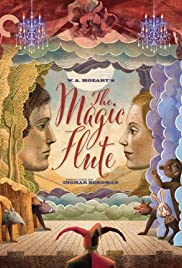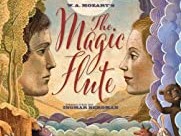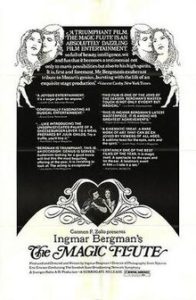The Magic Flute [Trollflöjten] **** (1975, Ulrik Cold, Josef Köstlinger, Irma Urrila) – Classic Movie Review 10,249
Director Ingmar Bergman’s 1975 Swedish film The Magic Flute [Trollflöjten] is a magical filming of Wolfgang Amadeus Mozart’s great opera, eavesdropping on a performance at Drottningholm’s 18th century court theatre in Stockholm.
With Sven Nykvist’s glorious Eastmancolor cinematography, and gorgeous settings and costumes, it looks as wonderful as it sounds, even if it is sung in Swedish. It is made for Swedish television but shown in cinemas worldwide. The film was premiered in August 1974 at Bergman’s house on Fårö in the old barn that had just been transformed into a cinema.
It is an Oscar nominee for Best Costume Design (Henny Noremark, Karin Erskine) and a Golden Globe nominee for Best Foreign Film. It won the 1976 BAFTA TV Award for Best Foreign Programme, further blurring the distinction between film and TV.
Bergman recalled: ‘As a boy I loved to roam around. One October day I set out for Drottningholm to see its unique court theatre. I remember distinctly what a bewitching experience it was. I have always seen The Magic Flute living inside that old theatre.’
The cast are Josef Köstlinger as Tamino, Håkan Hagegård as Papageno, Birgit Nordin as Queen of the Night, Irma Urrila as Pamina, Ragnar Ulfung as Monostatos, Ulrik Cold as Sarastro, Elisabeth Erikson Papagena, Britt-Marie Aruhn, Kirsten VaupelBirgitta SmidingThree Ladies, Erik Saedén as Speaker, Gösta Prüzelius as First Priest and Ulf Johanson –as Second Priest.
The writers are Emanuel Schikaneder (libretto), Alf Henrikson (translation) and Ingmar Bergman (screenplay). Die Zauberflöte by Wolfgang Amadeus Mozart is conducted by Eric Ericson.
The German-language libretto of The Magic Flute is by Emanuel Schikaneder, the theatre manager who also sang Papageno at the first performances in 1791 in the Theater auf der Wieden in Vienna. The Swedish poet Alf Henrikson prepared a Swedish-language version of the libretto in 1968 for a Royal Swedish Opera performance. Bergman adopted it as the basis of his screenplay but altered it in several ways. The renowned choir conductor Eric Ericson declined to conduct the opera at first but was later persuaded by Bergman to do so.
It is filmed at Drottningholm Castle Theater, Drottningholm Castle, Drottningholm, Stockholms län, Sweden; as well as in the studio at Filmhusateljéerna, Filmhuset, Svenska Filminstitutet, Gärdet, Stockholm, Stockholms län, Sweden; and the Swedish Film Institute, Råsunda, Stockholms län, Sweden.
Bergman saw The Magic Flute at the Royal Opera in Stockholm when he was 12 and sought to fulfill his early dream of a production in the Drottningholm Palace Theatre, one of the world’s few surviving Baroque theatres, which he visited as a boy. The introductory exterior shots are intended to suggest that it was filmed in the Drottningholm theatre, but the scenery there was considered too fragile to accommodate a film crew. So the stage – complete with wings, curtains, and wind machines – was copied and built in the studios of the Swedish Film Institute.
A recording session started on 6 April 1974, at the Circus Theater in Stockholm, including the singers, the Swedish Radio Symphony Orchestra and Ericsson’s choir, the Swedish Radio Choir. The singers later synchronised their mimed singing during filming, beginning on 16 April 1974 at Filmhuset in Stockholm, Studio 1, and completed in July.
It is the first made-for-TV film with a stereo soundtrack.
When it was premiered on TV on New Year’s Day 1975, it reached a third of the population of Sweden.
The Magic Flute [Trollflöjten] is directed by Ingmar Bergman, runs 135 minutes, is made by Sveriges Radio/ TV2/ AB Svensk Filmindustri/ Svenska Filminstituet, is released by Sveriges Radio/ TV2/ AB Svensk Filmindustri (1975) (Sweden), Gala Film Distributors (1975) (UK) and Surrogate (1975) (US), is written by Ingmar Bergman (screenplay) and Emanuel Schikaneder (libretto), is shot by Sven Nykvist, is produced by Måns Reuterswärd and designed by Henny Noremark.
Bergman recalled: ‘What we needed were warm, sensuous voices that had personality. It was essential that the play be performed by young actors, naturally close to dizzy, emotional shifts between joy and sorrow, between thinking and feeling. Tamino must be a handsome young man. Pamina must be a beautiful young woman.’
© Derek Winnert 2020 Classic Movie Review 10,249
Check out more reviews on http://derekwinnert.com




